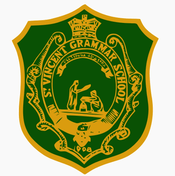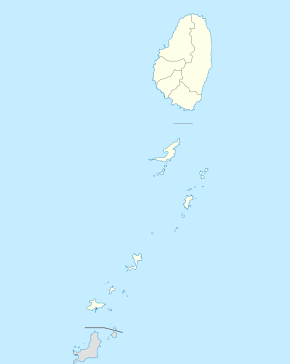St. Vincent Grammar School
St. Vincent Grammar School (abbreviated S.V.G.S) is a secondary school located in Richmond Hill, Kingstown, on the island of Saint Vincent in the Caribbean. Established in 1908, it is the oldest institution offering secondary level education in Saint Vincent and the Grenadines and is a single-sex school. Entrance to the school is by an academic selection test called the Common Entrance Examination, acceptance granted traditionally to those male students who rank in the top 150 places of his gender in the examination.
| St. Vincent Grammar School | |
|---|---|
 Crest of the St. Vincent Grammar School | |
| Location | |
 St. Vincent Grammar School Location in Saint Vincent and the Grenadines | |
Richmond Hill, Kingstown , | |
| Coordinates | 13°09′20″N 061°13′24″W |
| Information | |
| Type | Public Secondary School |
| Motto | Latin: Per Aspera ad Astra (Through hardships to the stars[1]) |
| Established | 21 September 1908[2] |
| Sister school | St. Vincent Girls' High School |
| Headmaster | Mr. Alfred John |
| Staff | 50 |
| Gender | Male |
| Age range | 10-19 |
| Number of students | 750 |
| Average class size | 30 |
| Language | English |
| Hours in school day | 7 |
| Classrooms | 27 |
| Campus size | 63,500 sq ft (5,900 m2) |
| Colour(s) | Green Gold |
| Website | svgs |
The St. Vincent Grammar School is one of the most academically successful and consistently high achieving secondary schools in Saint Vincent and the Grenadines, consistently ranking among the top three schools based on Caribbean Secondary Education Certificate (CSEC) examinations results. In the past five years, the school has recorded pass rates of upwards of 85%.
There are approximately 750 pupils on the school roll.
History
An attempt to have an institution for secondary education was made when the St. Vincent Grammar School was founded by an Ordinance in 1878. Conditions, however, were not satisfactory at the school and in 1885, moves were afoot to abolish it. The inhabitants on the island-here the influential minority-refused to support these moves and stated that they "would be just as clamorous for the restoration of such an institution as the people of Grenada now are for the establishment of one."
In 1887 another attempt at establishing another school was made when The Inspector of Schools, Mr F.H. Hawkins started the Kingstown Grammar School but the effort died when he was transferred a few years later to the Leeward Islands. A fourth Grammar School, a co-educational one, was started by Mr. Miles Phillips in 1896 and by 1899 had 42 pupils on its roll. As the thrust for more knowledge to promote the best interests of the emerging agro-based economy on the island of St Vincent, a new Agricultural School was established in 1900. Later that school would be further developed to become the St. Vincent Grammar School.
The St. Vincent Grammar School opened its doors in September 1908 with a student body of 13 and under a Resident Master Mr F.W Reeves who also held the portfolio of Inspector of Schools. Students entered the establishment at 8 years of age until the establishment of the Kingstown Preparatory School that catered to students from ages 5 to 11. In 1914, with the closure of the St. Vincent Agricultural School, the Grammar School took over its quarters. The present school still stands on the same premises though in a new building that was opened in 1965. The original building was still used on occasions for particular functions until its destruction by fire in 1999.
The original building was enlarged in 1932 to accommodate additional classrooms and, in 1940, the Headmaster's quarters was converted into the Headmaster's Office, Masters' Common Room and two classrooms. With the growth of enrollment, there was need for additional space which engaged the attention of the authorities in the early 1940s. By 1947, enrolment had grown to 203 and the additional space came in 1949 when, as quoted in the School Magazine of that year, "There is now an imposing entrance with a grand flight of steps leading to a small porch flanked by two patches of grass and beds of yellow flowers forming the letters "G"-"S". On each side of this entrance extend forty five feet of white architecture, housing two new classrooms, an assembly hall and a small room used for storing books." Provision was also made for the Headmaster's Office, Teachers' Common Room and lavatories. The school later boasted of hosting its first end-of-term dance in the new hall with its fluorescent lighting and with the school band.
Although for most of its existence the school was a boys' school, in 1948 for 'greater economy and efficiency', combined classes were held with its neighbouring school, the St. Vincent Girls' High School. In 1969, the sixth form as the Girls' High School was closed, and from 1969 to 1995, girls wanting to pursue advanced level studies were formally admitted as students to the Grammar School. This was mainly at the sixth form level but also involved at times the fourth and fifth forms of both schools. With its greater emphasis on the sciences, students from the Girls' High School were accommodated in the Grammar School's laboratory. This went on until there was a combined sixth form housed at the Grammar School and later an independent Sixth Form College.
The Grammar School was a fee paying institution that in the context of the times would have catered to students from 'better off' families. In 1911, however, the first scholarships were offered from primary schools. An annual exhibition paying tuition and providing a grant toward the cost of board and lodging for the recipient for four years was instituted in 1917. Students who became beneficiaries had to be residing not less than one mile beyond the boundary of Kingstown. By 1935, 17 boys were receiving free education through scholarships from Government, The Kingstown Board, the Anglican and Methodist Churches and the Reeves Memorial Scholarship. The George McIntosh-led St Vincent Working Men's Association from the beginning of its existence in 1937 offered three scholarships. A 1921 Island Scholarship Ordinance catered for a scholarship biennially to an approved university. It was awarded to the best performer in the Cambridge Senior Examination and was tenable for five years. In 1995 the last four students were awarded with island scholarships and the system was replaced with the National Scholarship and Exhibition Scholarships.
The St. Vincent Grammar School served the public and teaching service. In 1914, pupil teachers who demonstrated promise were selected for the two-year course at the School before beginning their teaching career. By 1936, with the hope of increasing the number of recruits from the secondary schools, the Cambridge Local Examinations replace the College of Perceptors as an entrance to the teaching service. In the 1950s, teachers of Secondary Schools provided lectures in academic subjects in a course specially organised by the education department for persons who were entering the primary school teaching service.
Motto
Per Aspera ad Astra is the motto of the St. Vincent Grammar School and it is a Latin phrase which means any of the following: "Through rough ways to the stars", "A rough road leads to the stars" or "To the stars through difficulties". The phrase is one of many Latin sayings which use the expression Ad astra.
The School's Motto appears on the School Crest.
Curriculum
St. Vincent Grammar School teaches a wide range of subjects and disciplines. Its curriculum is structured around the Caribbean Examinations Council (CXC) CSEC syllabuses and teaching based on these syllabuses usually begins at the Third Form (Year 9) level for some subjects. Like most other secondary schools in the Caribbean, Mathematics, English Language and one Foreign Language are compulsory at all levels.
A total of 13 subjects are offered in the first, second and third forms. Biology, chemistry, physics and principles of business are included at third form as the students prepare for the subsequent 'CXC Years' (Years 10 and 11). In these two final years, students are sorted into 6 different classes, based on their choice and/ or performance in third form. These classes, unlike in the previous forms, are specialised for certain subjects, meaning that each class offer subjects based on their type. For example, Forms 4 and 5 Technical are specialised for 'Technical' subjects such as Building Technology, while Forms 4 and 5 Science are specialised for 'Science' subjects such as Chemistry.
Each 'CXC' class offers 9 subjects but the student may do more but no less than 6. The CXC CSEC examinations are offered from April(or May) to June and students can write some these examinations while in the fourth form but most require at least two or three years exposure to the subject.
| Subjects offered at St. Vincent Grammar School | ||||||||||||||||
|---|---|---|---|---|---|---|---|---|---|---|---|---|---|---|---|---|
| ||||||||||||||||
| ||||||||||||||||
House system
There are four houses into which students are placed upon entry to the St. Vincent Grammar School. Each house has a House Master/Mistress, a House Captain and Vice Captain. Inter-House Competitions are held in all sports offered at the school. The sports that are currently being offered are:
- Cricket
- Football
- Athletics
- Table tennis
- Basketball
Annually, each house participates in an Inter-House Athletic Championship in which track and field events are contested. There are also inter-house competitions in Public Speaking and Debating.[2] Listed below are the houses of the St. Vincent Grammar School.
| House Name | Named After | Colour | |
|---|---|---|---|
| Crick | Ulric Crick | Red | |
| Lopey | William Lopey | Yellow | |
| Reeves | Fredrick Reeves | Blue | |
| Millar | Gilbert Millar | Green | |
List of Headmasters
| Headmasters of St. Vincent Grammar School[2] | |
|---|---|
| Headmasters | |
| Frederick Reeves | |
| Joseph Clarke | |
| Reverend Thomas Wade M.A | |
| William Lopey | |
| Fitz Gordon | |
| Gilbert Millar | |
| Ronald Hughes | |
| Ulric Crick | |
| Audley Morgan | |
| Winston Baptiste | |
| Stanley Campbell | |
| Lennox John | |
| Winfield Williams | |
| Margaret Leacock | |
| Hilton Browne | |
| Frank Jones | |
| Curtis King | Notable alumni
References |